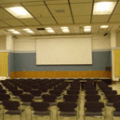Ninth annual McNair Scholars Program Research Symposium
Twenty-seven Montana State University students researching a range of topics – from race in British Victorian fairy tales to magnetic force stimulation to smartphone acquisition in adolescence – will share their findings during the McNair Scholars Program ninth annual Research Symposium.
The event will be held from 5 to 7 p.m. Monday, Dec. 3, in Ballrooms B and C of the Strand Union Building. It is free, and members of the university community and the public are encouraged to attend. Appetizers and refreshments will be provided.
MSU’s McNair Scholars Program is designed to support undergraduates who are minorities or who are first-generation and low-income students. The goal of the program is to increase the number of students from those underrepresented groups who go on to earn doctorates and become university professors, according to Shelly Hogan, director of the McNair Scholars Program at MSU.
Hogan noted that one important preparatory aspect of the program is to provide opportunities for scholars to share their research and creative projects at conference proceedings regionally and nationally.
“MSU’s McNair symposium is the first time that some of our students have prepared posters for presentation as undergraduates,” she said. “After this event they are more confident and competent when attending future national proceedings, such as the National Conference of Undergraduate Research. Furthermore, they have a much better understanding of what will be expected of them as successful graduate students.”
McNair Scholars participating in the symposium are listed below by name, major, project title and mentor/s.
- Terry Bradley, elementary education, “Why Family Matters: American Indian Students Finding Academic Success Within Higher Ed,” Jioanna Carjuzaa
- Celina Brownotter, architecture, “Tipi Techtonics: Culture, Beliefs, and Traditions Can Positively Affect Lakhota Tribal Housing,” Thomas McNab and Jillian Bertelli
- Brianna Bull Shows, microbiology, “Importance of Healthy Patient Provider Interactions,” Suzanne Held
- Strother Cooper, physics, “Initial Statistical Analysis of the Conceptual Survey of Electricity and Magnetism,” Shannon Willoughby
- Cesar Cruz, computer science and psychology, “Technology and Well-Being in College Students,” Neha John-Henderson
- Solange Dubreuil, ecology (organismal biology), “Cuban Coral Tissue Associated Microbiome DNA Extractions,” Amy Apprill and David Long
- Lauren Dupuis, chemistry, “A Convergent Synthesis of Diazonamide A,” Matt Cook
- Philip Eaton, nursing and psychology, “Culture and Spirituality and the Sexual Perceptions of Fort Peck Indian Reservation Adolescents,” Elizabeth Rink
- Faith Ellis, psychology, “Relationship Expectations in High School Dating Relationships,” Mitchell Vaterlaus
- Marisa Flores, math (statistics), “Identifying Melanoma Using Penalized Logistic Regression,” Katharine Banner and Dominique Zosso
- Nolan Grunska, philosophy and geography, “Are Scientific Models of Life Testable? A lesson from Simpson’s Paradox,” Prasanta Bandyopadhyay
- Katelyn Hancock, biotechnology (animal science), “Exclusion of Ants as a Biocontrol for Aphids in Western Montana Apple Orchards,” Laurie Kerzicnik
- Katherine Hernandez, history, “The Imperialist Mindset: Race in British Victorian Fairy Tales,” Maggie Greene and Kristen Intemann
- Derek Judge, electrical engineering, “Magnetic Force Stimulation in COMSOL,” Anja Kunze
- Trisheena Kills Pretty Enemy, microbiology, “Investigating Anaerobic Motile Bacteria: Clostridium Difficile Infection with Zebra Fish,” Seth Walk
- Betheny “Birdie” Kushner, philosophy, “The History of Obstetric Anesthesia,” Kristen Intemann
- Lori Lindgren, community health, “Smartphone Acquisition in Adolescence: A Case Study Approach,” Mitchell Vaterlaus
- Jessiah Mayer, nursing, “MUSSA Classified Staff Survey,” Charity Atteberry
- Carter McIver, mechanical engineering, “Biodegradable and Bio-Derived Polymers and Composites,” Cecily Ryan
- Alexis Oswalt, chemical engineering, “Exploring the Effects of Point Defects in Self-Assembled Monolayer Systems,” Joseph Menicucci and Stephanie McCalla
- Mikayla Pitts, community health, “Messengers for Health: Baa’ Nnilah Program,” Suzanne Held and Mark Schure
- Naomi Redfield, animal science, “Building Like a Beaver Using Drones to Map Network Formation of North American Beaver (L. Castor canadensis) Damming Complexes,” Jordan Kennedy and Nagpal Mahadevan
- Rebecca Schnabel, cell biology and neuroscience, “Investigating Methods to Understand Neurotransmitter Transporter VNUT and Nervous System,” Steve Stowers
- Angus Tomlinson, computer science, “Representing Music with Simplicial Complexes,” Brittany Fasy and David Millman
- Ryan Trefethen, financial engineering, “Medicaid and Montana: How National Healthcare Policy Affects Montanans,” Vincent Smith
- McCall Voy, anthropology and French, “Public Health in Greenland,” Elizabeth Rink and Ada Giusti
- Amber Yates, elementary education, “Mathematical Modeling: Analyzing K-8 Perceptions of Mathematics, Identity, and Expertise,” Megan Wickstrom
For more information about the MSU McNair Scholars Program or the research symposium, call 406-994-5072 or visit www.montana.edu/mcnair.
Cost: FREE
Time(s)
This event is over.
Mon. Dec. 3, 2018 5-7pm
More Events Like This
| Tweet |
